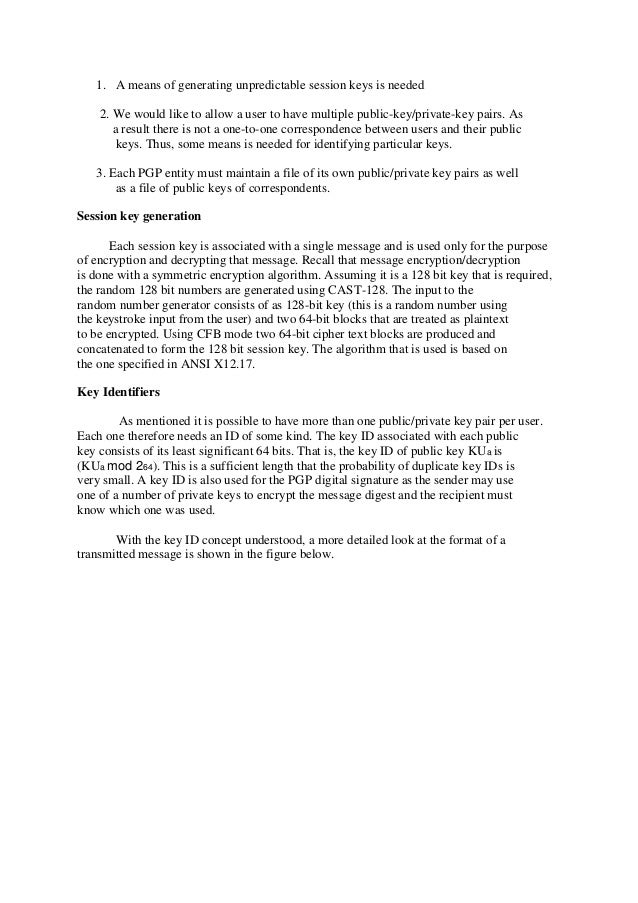A Means Of Generating Predictable Pgp Session Keys Is Needed
With this PGP key generator, you can generate your own private and public PGP keys. It is also possible to encrypt and decrypt a PGP message. There is no hidden transfer of plain text, and nothing is stored on the server. A means of generating predictable PGP session keys is needed. False E-mail is the most common distributed application that is widely used across all architectures and vendor platforms. SuccessFactors has included the Managing PGP Keys screen in Provisioning. This screen has two sections that relate to the two keys discussed earlier. Generate Key. The top half of the screen allows us to generate (a private/public key pair) and export the Public key our customer will use to encrypt data before sending it to us. Dan Geer quizzed Neumann on the difference between brittle and fragile. Neumann responded that brittle means an object breaks when tapped a bit; fragile means the object will probably fall off the shelf. In Multics, a failure in ring 0 would cause the whole system to collapse. A failure in ring 1 would only cause the process to crash. A: Most likely this is caused because PGP can't create the public and private key ring files. If the environment variable PGPPATH isn't defined, PGP will try to put those files in the subdirectory.pgp off your home directory. It will not create the directory if needed, so if the directory's not there already, PGP will abort after generating. The PGP Universal server automates the creation, management, and expiration of keys, sharing these keys among all PGP encryption applications. The Symantec PGP platform has now undergone a rename. PGP Desktop is now known as Symantec Encryption Desktop, and the PGP Universal Server is now known as Symantec Encryption Management Server. If these session identifiers use a predictable sequence, an attacker need only generate a value in the sequence in order to present a seemingly valid session token. This can occur at a number of places; the network level for TCP sequence numbers, or right through to the application layer with cookies used as authenticating tokens.
GNU gpg is encryption and signing tool.
The GNU Privacy Guard (GnuPG or GPG) is a free software replacement for the PGP suite of cryptographic software.

GnuPG encrypts messages using asymmetric keypairs individually generated by GnuPG users. The resulting public keys can be exchanged with other users in a variety of ways, such as Internet key servers. They must always be exchanged carefully to prevent identity spoofing by corrupting public key ↔ ‘owner’ identity correspondences. It is also possible to add a cryptographic digital signature to a message, so the message integrity and sender can be verified, if a particular correspondence relied upon has not been corrupted.
How do I create my own GnuPG private and public key
1) Login to your shell account
2) Use gpg command to create the keys$ gpg --gen-key
Output:
3) Now keys generated, you can list your own key using:$ gpg -K
OR$ gpg --list-keys
Output:
Let us try to understand the line pub 1024D/CA7A8402 2007-02-10:
- pub : Public key
- 1024D : The number of bits in the key
- CA7A8402 : The key ID
- 2007-02-10 : The date of key creation
- Vivek Gite : The user real name
- <vivek@nixcraftcorp.com> : The email id
A Means Of Generating Predictable Pgp Session Keys Is Needed Free
Most important is the key ID i.e. CA7A8402. Generate csr with public key. Make sure you use powerful passphrase to protect keys and not the easy one.
A Means Of Generating Predictable Pgp Session Keys Is Needed To Build
4) To list secret key, type the command:$ gpg --list-secret-keys
Output:
A Means Of Generating Predictable Pgp Session Keys Is Needed To Change
ADVERTISEMENTS